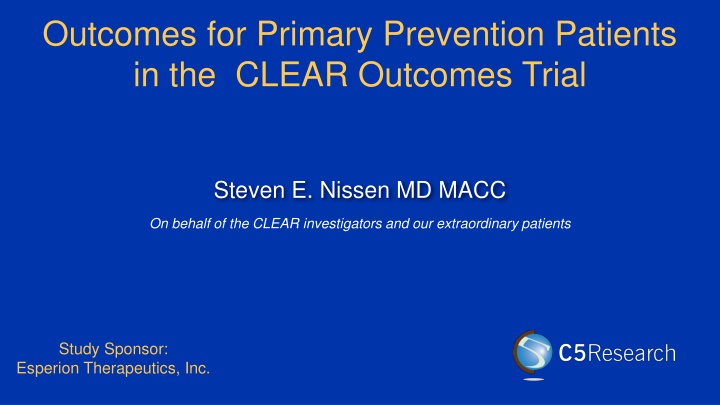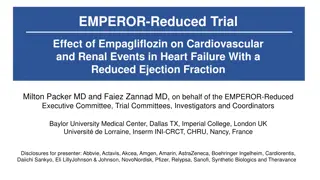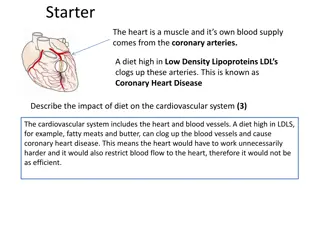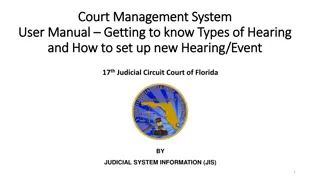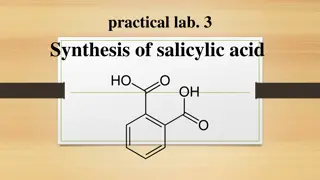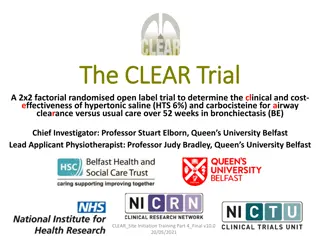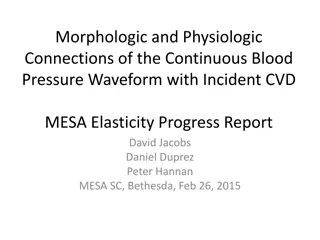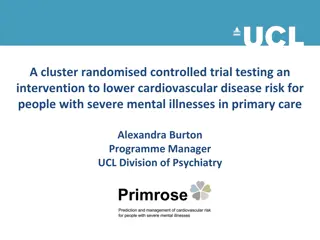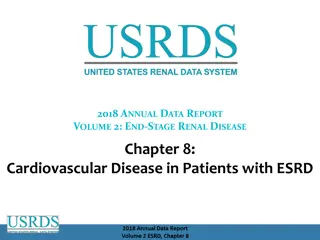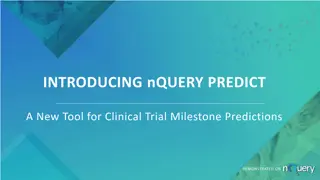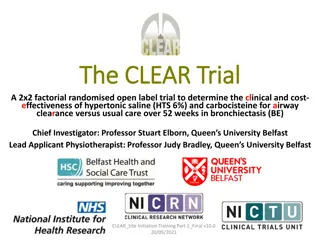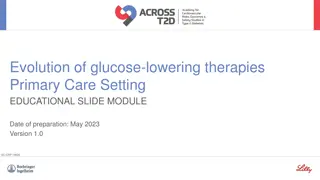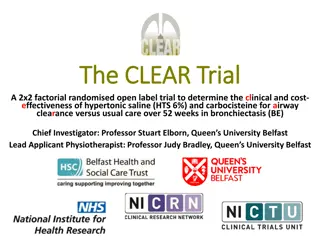CLEAR Outcomes Trial: Bempedoic Acid for Cardiovascular Prevention
The CLEAR Outcomes Trial investigated the effects of bempedoic acid, an ATP citrate lyase inhibitor, on cardiovascular outcomes in primary prevention patients. Results showed a reduction in cardiovascular events with bempedoic acid, particularly in patients intolerant to statins. Baseline characteristics, trial design, and effects on LDL-C and hsCRP are highlighted in the study.
Download Presentation

Please find below an Image/Link to download the presentation.
The content on the website is provided AS IS for your information and personal use only. It may not be sold, licensed, or shared on other websites without obtaining consent from the author.If you encounter any issues during the download, it is possible that the publisher has removed the file from their server.
You are allowed to download the files provided on this website for personal or commercial use, subject to the condition that they are used lawfully. All files are the property of their respective owners.
The content on the website is provided AS IS for your information and personal use only. It may not be sold, licensed, or shared on other websites without obtaining consent from the author.
E N D
Presentation Transcript
Outcomes for Primary Prevention Patients in the CLEAR Outcomes Trial Steven E. Nissen MD MACC On behalf of the CLEAR investigators and our extraordinary patients Study Sponsor: Esperion Therapeutics, Inc.
Background Bempedoic acid, an ATP citrate lyase inhibitor, inhibits hepatic cholesterol synthesis upstream of HMG-Co-A reductase, the enzyme inhibited by statins. Bempedoic acid is a pro-drug activated in the liver, but not peripheral tissues, resulting in a low incidence of muscle-related adverse events. The CLEAR outcomes trial demonstrated cardiovascular event reduction with bempedoic acid administration in patients unable or unwilling to tolerate guideline recommended statin doses. Effects of bempedoic acid on cardiovascular outcomes in the 30% (4200) primary prevention patients have not been fully described.
CLEAR Outcomes Trial Design Statin intolerance: An adverse effect that started or increased during statin therapy and resolved or improved after therapy discontinued. Intolerance to 2 or more statins or 1 statin if unwilling to attempt a second statin or advised by physician to not attempt second statin. Very low dose statin therapy permitted (< lowest approved dose). Bempedoic Acid 180 mg/day Cardiovascular outcomes assessed after 40.6 months median follow up Primary or secondary prevention patients with LDL-C 100 mg/dL 3 Matching Placebo
Definition of High Risk for Cardiovascular Event (Primary Prevention) Reynolds Risk score >30%, or SCORE risk >7.5% over 10-years, or Patients with Type 1 or 2 diabetes, aged >65 years (women) or >60 years (men), or CAC score of >400 AU at any time in the past 4
Primary Prevention Patients: Baseline Characteristics Bempedoic Acid N=2100 Placebo N=2106 Characteristic Mean Age (years) 67.9 68.0 Female sex 58.8% 59.2% Diabetes 65.2% 67.0% White 92.2% 90.8% LDL cholesterol (mg/dL) 142.2 142.7 HDL cholesterol (mg/dL) 51.1 50.9 Triglycerides (mg/dL) 162.0 161.5 Hemoglobin A1c 6.2 6.2 hsCRP (mg/L) 2.4 2.4
Effect of Trial Regimens on LDL-C and hsCRP 0% Percent Change in hsCRP Mean Reduction in LDL Cholesterol (%) -1.4% 5% Placebo -5% 0.6% 0% Median Percent Change (%) -0.6% -10% -5% Time averaged difference 23.2 mg/dL -10% -15% -15% -20% -20% Bempedoic acid -22.0% -25% -22.7% -25% -25.1% -30% Month 6 Month 12 -30% 0 3 6 Months since randomization 12 18 24 30 36 42 48 54 Placebo Bempedoic Acid
Effects on Major Adverse Cardiovascular Events 4-component MACE 3-component MACE Placebo Bempedoic Acid Placebo Bempedoic Acid Patients with an Event (%) Patients with an Event (%) HR 0.70 (95% CI 0.55-0.89) P=0.002 HR 0.64 (95% CI 0.48-0.84) P<0.001 Months Since Randomization Months Since Randomization
Effects on Myocardial Infarction and Stroke Myocardial Infarction Stroke Placebo Bempedoic Acid Placebo Bempedoic Acid Patients with an Event (%) Patients with an Event (%) HR 0.61 (95% CI 0.39-0.98) HR 0.76 (95% CI 0.46-1.26) Months Since Randomization Months Since Randomization
Effects on Cardiovascular Death and All-Cause Mortality Cardiovascular Death All-cause Mortality Placebo Bempedoic Acid Placebo Bempedoic Acid Patients with an Event (%) Patients with an Event (%) HR 0.61 (95% CI 0.41-0.92) HR 0.73 (95% CI 0.54-0.98) Months Since Randomization Months Since Randomization
Investigator-Reported Adverse Effects Bempedoic Acid N=7001 Placebo N=6964 Characteristic Serious Treatment Emergent Adverse event 19.9% 20.8% Adverse event leading to drug discontinuation 9.9% 9.9% Any muscle disorder 12.8% 13.9% New onset diabetes 6.4% 6.9% Elevated hepatic enzymes 4.5% 2.6% Prespecified renal events 10.3% 8.1% Gout 2.6% 2.0% Cholelithiasis 2.5% 1.1%
Limitations This was a secondary analysis of a subpopulation in a larger randomized trial. Such analyses can result in false positive findings due to testing of multiple subgroups. The inclusion of statin intolerant patients resulted in a relatively high LDL cholesterol. These were patients at high risk of a first cardiovascular event. Results may not apply to lower risk populations.
Conclusions Bempedoic acid was well-tolerated in primary prevention patients (66% with diabetes) unable or unwilling to take statins Bempedoic acid lowered LDL-C by 21.3% and hsCRP by 21.5% with small increases in the incidence of gout and cholelithiasis. 4-component MACE was reduced 30%, 3-component MACE 36%, myocardial infarction 39%, CV death 39%, and all cause mortality 27%. These findings suggest large benefits from lowering LDL-C and hsCRP with bempedoic acid in high-risk primary prevention patients.
